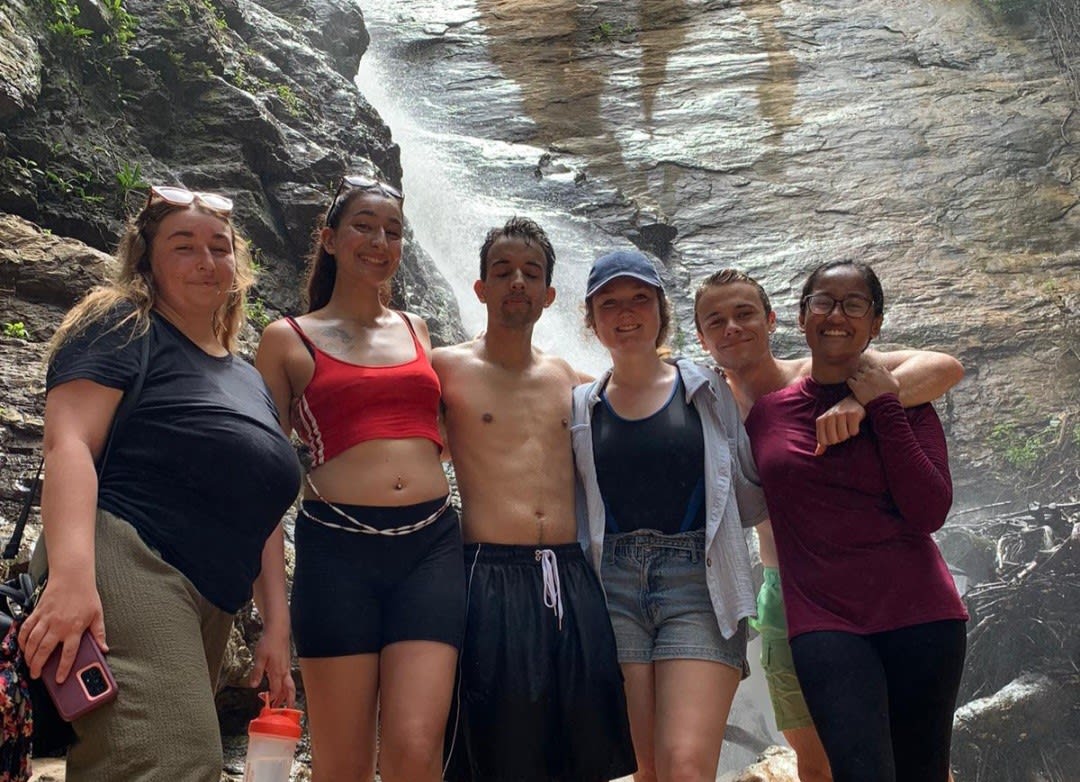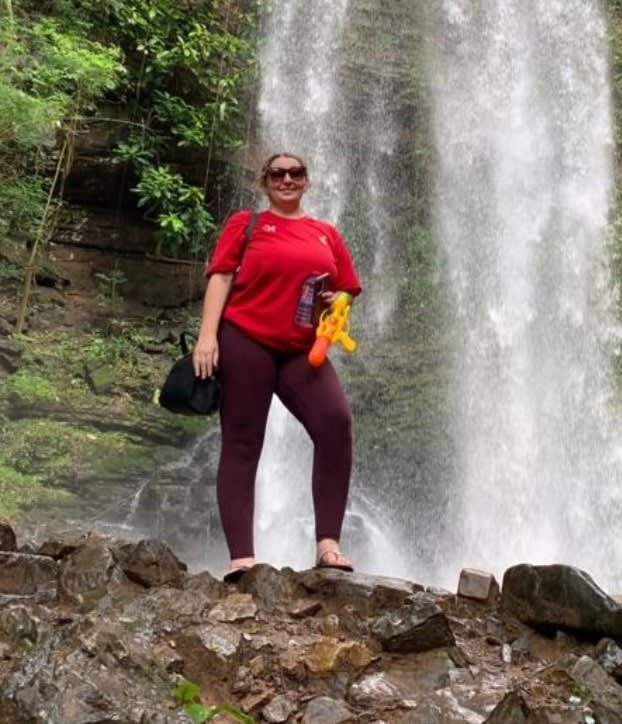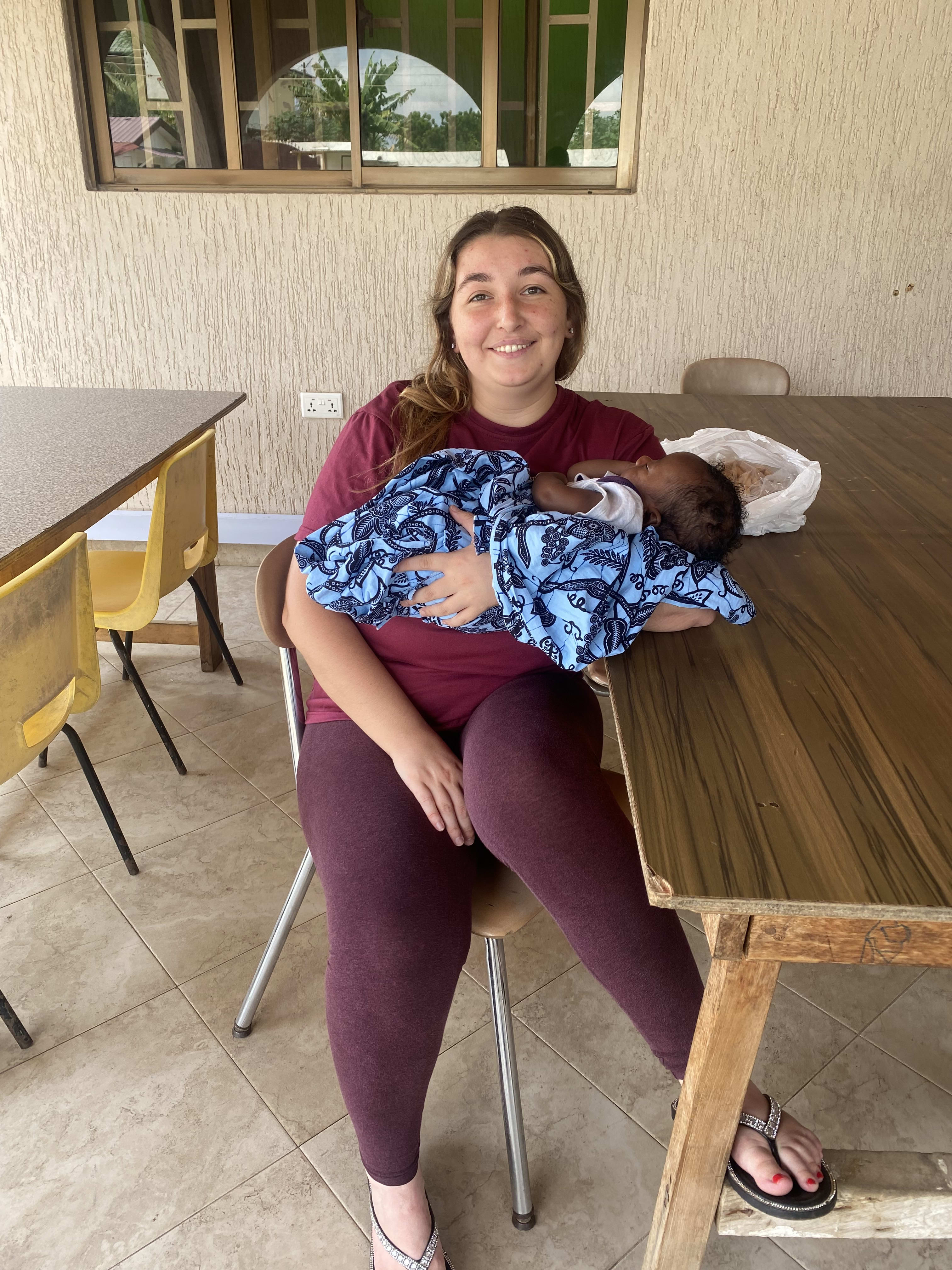
Amber Culley's experience at FOA gave her a unique insight into Ghana's culture. Moreover, she learnt the value of active listening and compassion, and the rewards of cross-cultural engagement.

From May to August 2023, I had the great opportunity and privilege to immerse myself within the Future of Africa (FOA) environment; otherwise known as a “FOA family”. FOA is surely not your ordinary, 9-5, boring, office style workplace. It is a place where the hopes of many young boys and girls are restored.
As a student at Wilfrid Laurier University in Waterloo, I had the opportunity to travel to Ghana as part the Arts Global Experience (AGX) program at Wilfrid Laurier for students. This program entails courses that teach about global issues, similarities and differences across cultures, self-reflection, self-awareness, awareness of privileges, and intersectionality. The opportunity for me to come to Ghana and FOA was also a result of being the recipient of the Laurier-Ghana Queen Elizabeth II Diamond Jubilee Scholarship-Internship based in criminology, social work and human rights. This scholarship-internship program assigned me to FOA - an organization that I did not previously know about.
When learning about FOA while still in Canada, my understanding was that it is a non-profit organization founded by a Wilfrid Laurier graduate and previous Laurier International staff member who is from Ghana. Upon returning home to Ghana, the founder of this organization was greatly motivated to address the concern of street children and youth on the streets of Accra. As well, that they are a very communal or family-based organization that aims to assist street children and youth over long periods of time in various ways such as through skills learning, education, therapy, emotional support, residence, food and water, activities, and essential life skills. This information got me intrigued.
Then, when I began my role at FOA, I quickly noticed and had it expressed to me, that it is not like a corporate workplace, it is a community centre. There is often noise, music, dancing, games, and some chaos going on - but that is just the nature of the work that they do. As someone who is quite a calm, quiet or introverted person at times, this environment could be overwhelming. However, I found that I was able to immerse myself in different ways.
Besides working one-on-one with residents and street residents, I was able to take part in different tasks that were of interest to me. At the beginning of my internship with FOA, I was tasked with making goals as a plan of what I would like to do and accomplish during my time with the organization. However, I found that the things I immersed myself in definitely changed day-by-day, and this was surely not a negative thing. I have learned that within a non-profit organizational environment, and especially with FOA, there are ongoing discussions, changes, voting, and new ideas about what can be done. Therefore, there were days where I was approached and tasked with something new. The fact that members of FOA ongoingly come up with new ideas demonstrates the critical thinking, problem solving, creativity, innovation and motivation to help others that strongly exists within this Ghanaian organization.
Outside of the things I was tasked with, I was able to be invited into staff meetings regarding the entire team and the Programs Team. The Programs Team supports the smooth functioning and upward development of Sunday Street Outreach, Wellness Wednesdays, resident intakes, healthcare concerns, some website development, Female Centred Programming, Academic and Essential Life Skills (ELS), tutoring of residents, planning for the year ahead, resident orientations, conflict resolution among residents, therapy and emotional support for residents, and family reunification.
During meetings, there were opportunities to share how you are feeling, highlights and low-lights of your week, any ideas or critiques, deliver or listen to presentations, have discussion, or make decisions. This provided me with a lot of insight regarding the functioning of FOA, their values, and their priorities. It was also a great opportunity for me to practice professional, communication, critical thinking, problem solving, innovation and creativity, technological and intercultural skills.


When thinking about the intercultural experience I had, there were many things that were new to me when arriving in Ghana. The staff, volunteers and residents at FOA were helpful in providing information about the cultural context of Ghana; and this assisted me with my adaptation to a place that I have never been before. As well, I was able to experience different cultures. I was able to notice differences and experiences among those from different economic and personal situations in Ghana. Further, I was able to recognize some differences in greetings, values and norms that exist in Ghana compared to in Canada. While I engaged with locals and University of Ghana representatives outside of my internship placement, having Ghanaians that you can develop a close relationship with and interact with daily greatly enriched my cultural understanding of Ghana. One learning experience was how there may at times be things that conflicted with my own values, but I was able to see why people at FOA, or those applying to assist with FOA, may think the way that they do and be understanding of the cultural differences. I did have the opportunity to develop a psychology volunteer hiring process and conduct interviews. During these interviews, there were at times thoughts interviewees shared that I knew would be problematic in my own cultural context. Yet, I was provided with a good learning experience to practice my understanding and acceptance of other cultures, to know that others think differently than one another, that it is very important to avoid having an implicit bias or superiority complex, and that local media, news or politics influences beliefs and values wherever you are in the world.
Another important point I would like to make is that while I learned a lot from the staff members at FOA, the residents and street residents had a lot to teach me as well. They were very open and gracious regarding their stories and getting to know me. I would try to initiate conversations and “significant interactions”, in which I would learn more about their life experiences, struggles on the streets, needs, and goals; and then fill out an interaction form for this. Yet, there were also many times when the residents and street residents approached me by their own initiative to ask for help with their academic learning, to have a casual conversation, or to have a long conversation. One moment that really ‘stuck’ with me was when I was inside the centre taking a break for a moment, and everyone else was outside interacting with other residents when one of the male street residents approached me and ended up speaking with me for nearly two hours.
There were other people who came indoors and would ask to join the conversation, and this boy would say “no” to them or remain silent until they had left. I did not understand why this boy was drawn to me, but it felt very good to be a positive outlet that he could go to. Although, I soon realized that hearing what these children and youth have to share with you can be troubling for your own mental health, with feelings of second-hand trauma and a need for more self-care inflicting you. With this, I learned the importance of active listening and showing compassion for others while also taking care of yourself by doing self-reflection and recognizing when you are feeling burnout.
Overall, engrossing myself within FOA was definitely a new experience for me, and carried some challenges, but was a very rewarding and educational experience. I did face some concerns during my time as an intern, such as struggling with local foods and being very ill more than once. There were also at times some differences in opinion or thought, but FOA maintains a very respectful and friendly environment that allows others to provide their perspectives comfortably. I have now gained new knowledge and experience in working with others, the issue of street residents in Ghana, and how to work well with children, youth and those who have faced abuse and trauma.
[Written by Amber Culley]